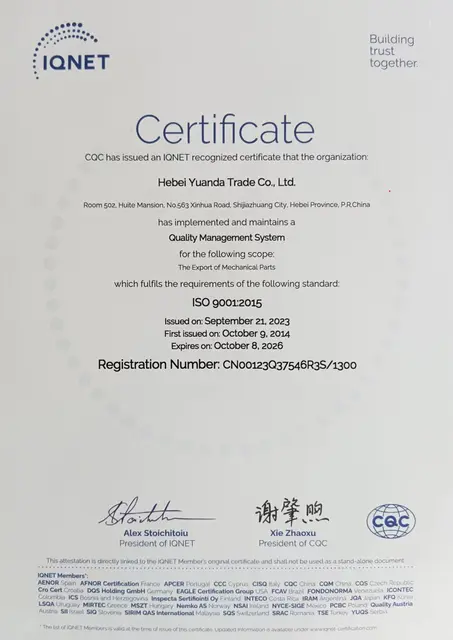Mobile:+86-311-808-126-83
Email:info@ydcastings.com
aluminium slab casting
Aluminium Slab Casting An Overview
Aluminium slab casting is a crucial process in the metallurgical industry, aiming to produce high-quality aluminum slabs used in various applications. This process plays a significant role in the manufacturing of aluminum plates, sheets, and other products essential in sectors such as automotive, aerospace, and construction.
The casting process typically begins with the melting of aluminum scrap or ingots in a furnace. The melting temperature is generally around 660 degrees Celsius. Once the aluminum reaches the desired molten state, it is carefully tempered to eliminate impurities and achieve the required chemical composition. This stage is critical as the quality of the final product heavily depends on the smoothness and homogeneity of the molten aluminum.
After melting, the liquid aluminum is poured into a continuous casting machine where it is formed into slabs. The slab casting process can be broadly categorized into two types direct and indirect casting. In the direct casting method, molten aluminum is poured directly into a mold. In contrast, the indirect method involves feeding the liquid metal through a series of cooling rollers that gradually solidify the aluminum into a continuous slab.
aluminium slab casting

A crucial element of aluminium slab casting is ensuring uniform cooling to prevent defects such as warping or cracking
. Advanced cooling systems, such as water-cooled molds or air-cooling techniques, are employed to manage the temperature effectively. The cooling rate significantly influences the microstructure of the aluminum, affecting its mechanical properties and overall quality.
Once the slabs have solidified, they are removed from the casting machine and undergo further processing. This may include trimming to size, surface treatment, and heat treatment to enhance the material properties. Heat treatment is particularly important as it can improve the strength, ductility, and durability of the aluminum slabs, making them suitable for critical applications.
Quality control throughout the casting process is vital. Metallurgical tests are often conducted to assess the alloy's composition, mechanical properties, and microstructural integrity. Non-destructive testing methods, such as ultrasonic testing and X-ray inspection, are commonly employed to identify any internal defects within the slabs.
In summary, aluminium slab casting is a highly technical and vital process that impacts various industries around the world. The combination of careful temperature control, cooling techniques, and quality assurance ensures that the final product meets the stringent standards required for diverse applications. As technology advances, innovations in the slab casting process continue to enhance efficiency, sustainability, and the quality of aluminum products, contributing to the industry's growth and development.
-
Impeller Technology That Powers Precision in Pump SystemsNewsMay.22,2025
-
Valve Durability Begins with Quality Cast Iron ComponentsNewsMay.22,2025
-
Performance Cooling with Advanced Automobile Water Pump SolutionsNewsMay.22,2025
-
How Motor Housing and Oil Pans Shape Engine PerformanceNewsMay.22,2025
-
How Metal Castings Drive Modern Manufacturing EfficiencyNewsMay.22,2025
-
Exploring the Engineering Behind Valve Body CastingsNewsMay.22,2025











